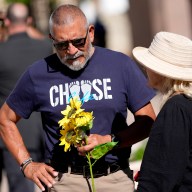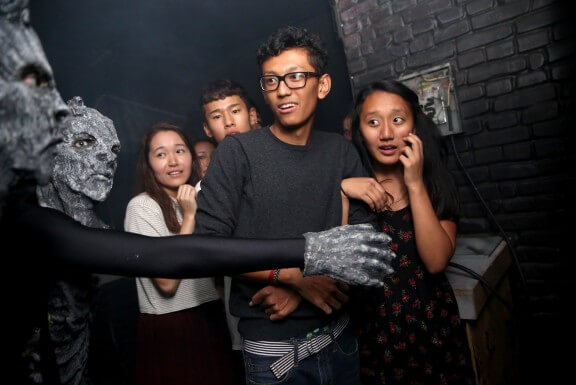 Former Beatles secretary Freda Kelly is enjoying finally getting some attention.
Former Beatles secretary Freda Kelly is enjoying finally getting some attention.
Credit: Getty Images
Freda Kelly spent years not talking about her former swanky job: as the secretary for the Beatles, specifically manning their fan club, from 1961 to 1972. When she decided to finally break her silence, it was for entirely selfish reasons.
“I just wanted a little DVD for my grandson,” she says. Various people approached her over the years, wanting her to write books and do interviews. “I just shrugged it off. There’s too many out there, and everybody knows the story anyway. But when my grandson came along, my daughter said, ‘Oh, mum, your memory’s going and you don’t write anything. Do something for Nile, to let him know what you did.”
This wound up becoming “Good Ol’ Freda,” a feature-length documentary consisting of Kelly reminiscing about her former employers. In film, and in person, she radiates a genuine modesty and warmth, feeling, well, grandmotherly.
Asked why she spent so long shooting down interview requests, she replies, “I just wanted to be what I was: a housewife and a normal person.” She did other jobs after working for the Beatles, including working on a farm and working for a landscape contractor. Even while shooting, she was unconvinced about how interesting she would be to outside parties, which she brought up to her director, Ryan White. “I kept saying, ‘Do you have enough? Do you think you have enough for a film? I don’t think you have enough for a film.’”
Yet even at 86 minutes, there are plenty of stories that didn’t make the cut. White shot some 40 hours of interviews, and promises that a particularly juicy story — about a raucous afterparty for the 1967 film “How I Won the War,” which featured John Lennon — will be on the DVD. Asked for what happened, Kelly demurs, saying we don’t have enough time to go into it.
She still elaborates on stories in the film, particularly about how — because she had initially and accidentally put the fan club address as her family’s — she got fans coming to her home. Some she even put up, or gave bus fare.
Once the Fab Four relocated to London and she chose to stay behind, she found herself becoming a bit of a stalker too. “Once I knew a Beatle was at home with their parents, I was there like a shot. Because I needed them to sign things for the fan club,” she recalls. “They must have had enough — ‘She’s turned up again with that bag full of stuff.’ They never told me to ‘Go away, I’m not doing it.’”
One of her bosses, Ringo Starr, appears at the end of the film. But it’s not a reunion. “I haven’t spoken to him,” Kelly says. After the fan club was dissolved, she kept in touch for three years. “I can’t even remember how it faded out. I wouldn’t have kept in touch because I had moved on then.” She did go see both Paul and Ringo concerts in Liverpool, where she still resides. But she didn’t meet with them. “I wouldn’t knock on the door and go, ‘Hello! I used to work for you 40 years ago! Can I come in?’”
Asked what her favorite song is, she resists, saying there are too many, then names“Here, There and Everywhere” (“for the harmonies”). But not all are winners. “‘Hey Jude,'” she blurts out. “I’m not keen on ‘Hey Jude.’ I think it goes on forever.”
The director’s take:
Filmmaker Ryan White actually knew Kelly for years, as his uncle is Billy Kinsley, of the fellow Liverpudlian breakout band The Merseybeats. But he had no idea of her former job. “She really is that private,” he says. He found himself thrust into making a film on a subject he never dreamed of tackling. “I wanted to do something that wasn’t just telling the Beatles story again,” he says. Kelly provided an interesting angle. “She’s one of the few members of the inner circle who hasn’t passed away. She has one of the few female perspectives on the inner circle. And this is one of the few untold stories — probably the last true story you’ll hear about the Beatles. She also has an interesting perspective because she can humanize them. She knew them.”














